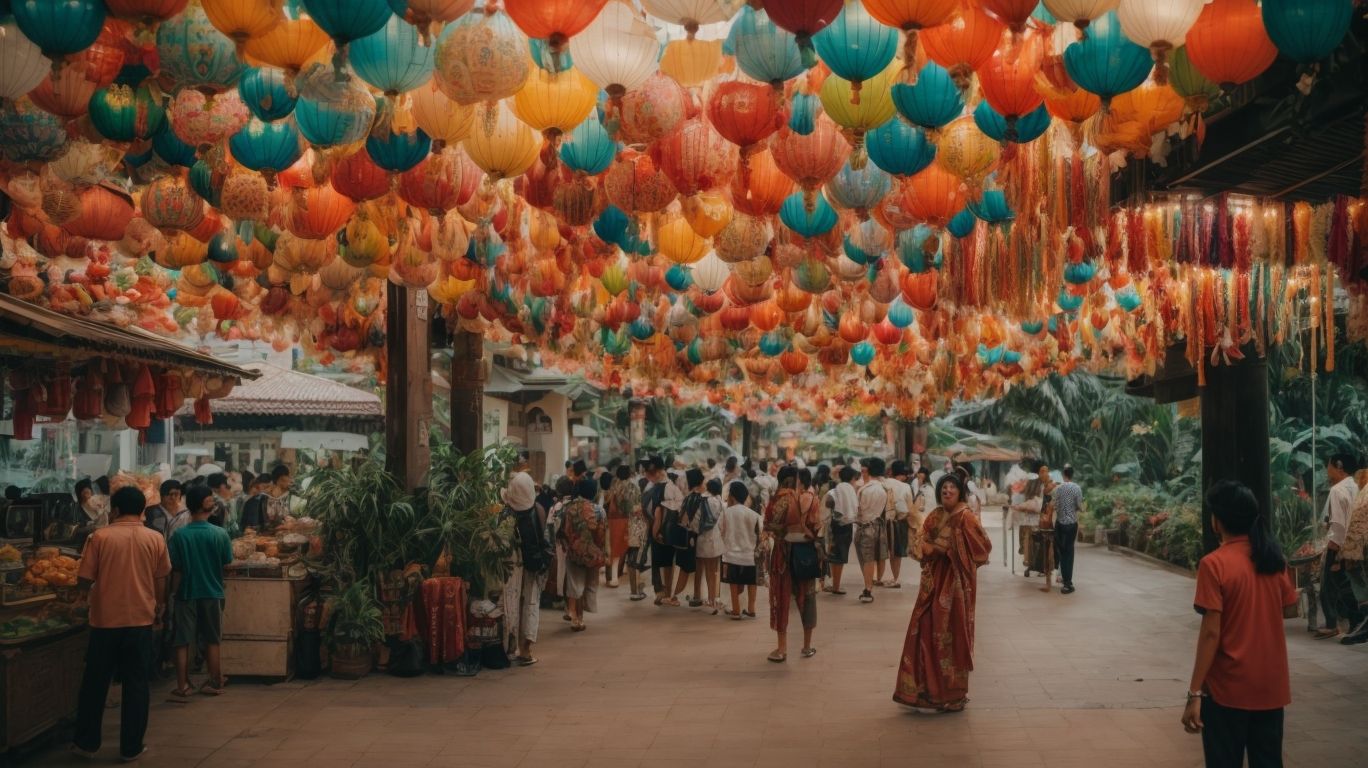
Welcome to the bustling city of Singapore, a melting pot of cultures and a top destination for expats. If you’re considering a move to this vibrant city-state, you may have some concerns about adapting to a new culture and lifestyle. In this article, we’ll take a closer look at the unique experience of being an expat in the Lion City and provide some insights to ease your transition.
What Is an Expat?
An expat, short for expatriate, is a person who resides in a country different from their native country. These individuals are typically professionals or retirees who move abroad for work opportunities, lifestyle changes, or personal reasons. Expats often face the challenge of adapting to a new culture, language, and social environment. They may experience a mix of excitement, homesickness, and personal growth during their time abroad.
Pro-tip: To make the most of your expat experience, embrace the local culture, connect with fellow expats for support, and take the time to explore and appreciate your new surroundings.
Why Do People Become Expats?
Moving to a new country as an expat is a life-changing decision that requires careful consideration. In this section, we will explore the various reasons why people choose to become expats. From seeking out better job opportunities to improving their quality of life, there are many factors that influence this decision. Additionally, we will also touch upon the desire for cultural exploration and how it motivates individuals to embark on this journey. Join us as we unveil the different facets of the expat experience in the Lion City.
1. Job Opportunities
Finding employment opportunities is one of the main reasons for becoming an expat. Here are some steps to take when searching for job opportunities abroad:
- Research: Conduct thorough research on the job market, industries, and companies in the country you are considering.
- Networking: Utilize professional networks, online platforms, and expat communities to connect with individuals and organizations in your field.
- Language skills: Improving your language skills in the local language can open up more job opportunities and aid in integration.
- Visa and work permits: Familiarize yourself with the visa and work permit requirements of the country you plan to move to in order to have a smooth transition.
- Local job portals: Explore local job portals and recruitment agencies that specialize in placing expats.
- Global companies: Research multinational companies that have a presence in both your home country and the country you are considering.
- Professional qualifications: Make sure that your qualifications and certifications are recognized and valued in the job market of the country you plan to move to.
2. Better Quality of Life
Expats often make the decision to relocate in pursuit of a better quality of life. This includes various factors such as improved job opportunities, higher income potential, access to superior healthcare and education systems, safer living conditions, and a cleaner environment. Additionally, expats may strive for a better work-life balance, increased leisure opportunities, and a more inclusive society.
For instance, there is a true account of Jane, who moved abroad and discovered a better quality of life in terms of work-life balance. She enjoyed shorter working hours, more vacation time, and a supportive work environment, ultimately resulting in increased happiness and satisfaction in both her personal and professional life.
3. Cultural Exploration
Cultural exploration is an important aspect of the expat experience, allowing individuals to fully immerse themselves in a new culture and gain a deeper understanding of their host country. To engage in cultural exploration as an expat, it is recommended to follow these steps:
- Learn the local language: This will enable better communication and facilitate deeper connections with locals.
- Participate in cultural events: Attend festivals, exhibitions, and performances to experience traditional customs and art forms.
- Try local cuisine: Explore the diverse flavors and dishes of the local cuisine, including street food and traditional restaurants.
- Visit historical and cultural landmarks: Discover the rich history and heritage of the host country by exploring museums, historical sites, and monuments.
- Engage with locals: Interact with locals to learn about their customs, traditions, and way of life. This can be done through community activities or joining local clubs/organizations.
By embracing cultural exploration, expats can enrich their experience and create meaningful connections in their new home.
What Are the Challenges of Being an Expat?
Moving to a new country can be an exciting and life-changing experience, but it also comes with its fair share of challenges. As an expat, you are faced with the task of adjusting to a new culture, language, and environment. In this section, we will delve into the various challenges that expats may encounter during their time in the Lion City. From culture shock to homesickness, we will explore the different aspects of expat life that can be difficult to navigate.
1. Culture Shock
Experiencing culture shock is a common occurrence for expats who relocate to a new country. To navigate this transition, here are some helpful steps:
- Recognize and accept that there will be cultural differences.
- Take the time to learn about the local customs, traditions, and social norms.
- Make an effort to learn the local language to facilitate communication.
- Keep an open mind and be willing to adapt to new ways of living.
When I moved to Japan, I also experienced culture shock. The language barrier and unfamiliar social customs were initially challenging. However, by immersing myself in the local culture, making friends, and embracing new experiences, I was able to overcome culture shock and fully enjoy my expat experience.
2. Language Barrier
Expat life can be exciting, but one challenge is the Language Barrier. Here are steps to overcome it:
- Learn the basics: Start with common phrases and greetings in the local language.
- Enroll in Language Classes: Join a language school or take online courses to improve your proficiency.
- Practice with locals: Engage in conversations with native speakers to enhance your speaking skills.
- Use Language Learning Apps: Utilize apps like Duolingo or Rosetta Stone for convenient practice.
Pro-tip: Immerse yourself in the local culture by watching movies, listening to music, and reading books in the local language. This will enhance your language skills and understanding of the culture.
3. Homesickness
Homesickness is a common challenge for expats living abroad. Here are some steps to help cope with homesickness:
- Stay connected: Regularly communicate with family and friends back home through calls, video chats, or social media.
- Establish a routine: Create a daily routine that includes activities you enjoy and helps you feel grounded in your new environment.
- Explore your surroundings: Get to know your new city by exploring its attractions, trying local cuisine, and immersing yourself in the culture.
- Build a support network: Seek out expat communities, join clubs or organizations, and make new friends who can relate to your experience.
Remember, homesickness is a natural feeling, but with time and effort, you can cultivate a sense of belonging and make your expat experience a fulfilling one.
4. Adapting to a New Environment
Adapting to a new environment as an expat requires time and effort. Here are steps to help ease the transition:
- Research: Learn about the local culture, customs, and traditions.
- Language: Take language classes or use language learning apps to communicate effectively.
- Network: Join expat groups or local communities to meet new people and build a support system.
- Explore: Discover the city, visit landmarks, and try local cuisine to familiarize yourself with the environment.
- Be open-minded: Embrace new experiences, be willing to learn, and adapt to different ways of doing things.
- Patience: Understand that adapting to a new environment takes time and be patient with yourself.
What Is the Expat Experience Like in Singapore?
Moving to a new country can be a thrilling yet daunting experience, especially for expats. Singapore, known as the Lion City, is a popular destination for expats due to its strong economy and high standard of living. However, the expat experience in Singapore is not without its unique challenges and perks. In this section, we will uncover the various aspects of living as an expat in Singapore, including the high cost of living, the multicultural society, the efficient public transport system, and the strict laws and regulations.
1. High Cost of Living
Living expenses in Singapore are known to be quite high. The city-state is ranked among the most expensive places globally, mainly due to its expensive housing, transportation, and healthcare. Food and utilities are also relatively pricey. However, it is worth noting that the high cost of living is balanced by the excellent infrastructure, efficient public transport, and overall high standard of living.
Expats in Singapore often adapt to these expenses by adjusting their lifestyles, exploring housing options outside the city center, and taking advantage of local discounts and promotions. Despite the high costs, many expats find the experience worthwhile due to the exceptional opportunities and quality of life the city has to offer.
True story: Jane, an expat from the United States, initially found the high cost of living in Singapore overwhelming. However, she quickly learned to navigate the expenses by researching affordable housing options and embracing the local food scene. She discovered that by shopping at local markets and hawker centers, she could enjoy delicious meals at a fraction of the cost of dining out. Additionally, Jane took advantage of the efficient public transport system, which helped her save on transportation expenses. With some adjustments, she was able to comfortably manage the high cost of living and fully enjoy her expat experience in Singapore.
2. Multicultural Society
Singapore is renowned for its lively and diverse culture, making it a sought-after destination for expats looking for a multicultural environment. With a population consisting of individuals from various ethnic backgrounds, religions, and cultures, expats in Singapore have the opportunity to experience a melting pot of traditions, languages, and cuisines. This multicultural society provides avenues for cultural exchange, learning, and expanding one’s perspectives.
Expats can participate in activities such as:
- Exploring ethnic neighborhoods
- Attending cultural festivals
- Engaging with both locals and fellow expats to fully immerse themselves in the vibrant multicultural experience that Singapore has to offer
Embrace the diverse society of Singapore and have an enriching experience!
3. Efficient Public Transport
Efficient public transport is one of the key factors that make living as an expat in Singapore convenient and enjoyable. Here are some steps to navigate the city’s efficient public transportation system:
- Get an EZ-Link card: This contactless smart card allows for seamless travel on buses, trains, and even some taxis.
- Plan your journey: Utilize online resources to map out the most efficient routes and check for any updates or disruptions.
- Use the MRT: Singapore’s Mass Rapid Transit system is clean, reliable, and covers most areas of the city.
- Hop on a bus: Buses are a great way to reach destinations not served by the MRT, and they run frequently.
- Try the LRT: The Light Rail Transit system connects to certain neighborhoods, offering an additional mode of transportation.
- Utilize Grab or taxis: For more convenience or when traveling in groups, you can opt for ride-sharing or traditional taxis.
- Consider cycling: Singapore has an extensive network of cycling paths, making it a convenient and eco-friendly option.
4. Strict Laws and Regulations
Strict laws and regulations in Singapore ensure a safe and orderly society. For expats, it’s crucial to understand and abide by these laws. Here are steps to navigate Singapore’s strict laws and regulations:
- Research: Familiarize yourself with the local laws and regulations, including the seemingly trivial ones.
- Comply: Ensure you follow all legal requirements, such as obtaining necessary permits or licenses.
- Respect: Show respect for local customs, traditions, and cultural sensitivities.
- Stay updated: Keep track of any changes or updates in laws and regulations to avoid any legal complications.
- Seek advice: If in doubt, consult with local authorities or legal professionals for guidance.
Story: A friend of mine moved to Singapore and was unaware of the strict laws regarding chewing gum. He innocently brought some with him and was surprised when he got fined for possession. It taught him the importance of understanding and respecting local laws, including seemingly trivial ones, no matter how seemingly trivial.
What Are the Must-Do Experiences for Expats in Singapore?
As an expat in Singapore, there are countless opportunities to immerse yourself in the vibrant culture and diverse experiences that this city has to offer. In this section, we will uncover the must-do experiences for expats in Singapore. From indulging in delicious local foods to exploring the different neighborhoods, participating in cultural festivals, and making friends with locals and other expats, there is never a dull moment in this bustling city. Get ready to add some exciting experiences to your expat journey in the Lion City.
1. Trying Local Foods
When living as an expat in a new country like Singapore, trying local foods is a must-do experience. Here are some steps to fully enjoy the culinary delights of the region:
- Visit Hawker Centers: These bustling food markets offer a wide range of local dishes like Hainanese chicken rice and laksa.
- Try Street Food: Wander through the streets and sample local street food classics such as satay, roti prata, and chili crab.
- Explore Ethnic Cuisines: Singapore is a melting pot of cultures, so be sure to try Malay, Indian, and Chinese cuisines.
- Attend Food Festivals: Immerse yourself in the local food scene by attending food festivals like the Singapore Food Festival.
2. Exploring Different Neighborhoods
Exploring different neighborhoods as an expat in Singapore is an exciting way to immerse yourself in the local culture and discover unique experiences. Here are some steps to help you make the most of this opportunity:
- Research neighborhoods: Educate yourself about the various districts in Singapore, including Chinatown, Little India, and Tiong Bahru.
- Visit popular spots: Discover and visit iconic places such as Marina Bay Sands, Gardens by the Bay, and Sentosa Island.
- Try local cuisine: Indulge in diverse food options in each neighborhood, ranging from hawker centers to Michelin-starred restaurants.
- Connect with locals: Engage with the community through activities like volunteering or joining local interest groups.
By following these steps, you can fully embrace the diversity and vibrancy of Singapore’s neighborhoods as an expat.
3. Participating in Cultural Festivals
Participating in cultural festivals is a great way for expats to fully immerse themselves in the local culture and create meaningful connections. Here are some steps to get involved:
- Research: Look up the upcoming cultural festivals in your new city.
- Plan: Mark the dates and locations of the festivals you’re interested in attending.
- Learn: Familiarize yourself with the customs, traditions, and significance of the festivals.
- Engage: Participate in activities like dance, music, or traditional games during the festivals.
- Connect: Strike up conversations with locals and fellow expats to learn more about the festival and make new friends.
- Document: Take photos or videos to capture and share your experiences with others.
- Reflect: Take time to reflect on what you’ve learned and how the festival has enriched your understanding of the local culture.
4. Making Friends with Locals and Other Expats
Making friends with locals and other expats is a crucial aspect of the expat experience. Here are some steps to help you build meaningful connections:
- Join expat groups or communities: Attend meetups, join social clubs, or participate in local events specifically designed for expats.
- Use social media platforms: Join expat groups on Facebook, LinkedIn, or other social media platforms to connect with like-minded individuals.
- Attend language or cultural exchange programs: Participate in language classes or cultural exchange programs to meet both locals and fellow expats.
- Volunteer or participate in community activities: Engage in volunteer work or join community activities to connect with people who share similar interests.
“When I relocated to Singapore as an expat, I initially struggled to make friends. However, by actively engaging in local events, joining expat groups, and volunteering in the community, I was able to meet incredible individuals from diverse backgrounds. Through these connections, I not only gained insight into the local culture but also formed a support system that made my expat experience in the Lion City more fulfilling and unforgettable.”





